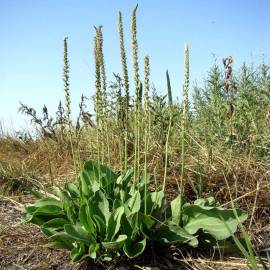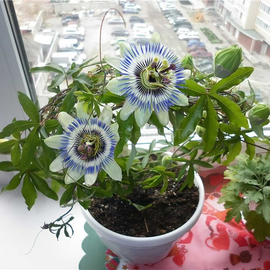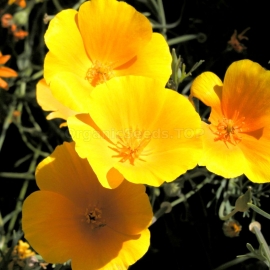





«Poltava» - Plantago Major Seeds
1.14 €
Plantain is edible and medicinal, the young leaves are edible raw in salad or cooked as a pot herb, they are very rich in vitamin B1 and riboflavin. The herb has a long history of use as an alternative medicine dating back to ancient times.
-
Plantago Major «Poltava»
Plantago major is an herbaceous perennial species of plantago, family Plantaginaceae. The plant is native to most of Europe and northern and central Asia, but has widely naturalised elsewhere in the world.
Plantago major grows in lawns and fields, along roadsides, and in other areas that have been disturbed by humans. Native Ameicans called it "white man's foot print" because it appeared and thrived in distrubed areas around European settlements. Plantago does particularly well in compacted or disturbed soils and can survive repeated trampling. Its roots work to break up hard pan soil and can help stop erosion.
Plantain Medicinal Properties and Herbal Use
Plantain is edible and medicinal, the young leaves are edible raw in salad or cooked as a pot herb, they are very rich in vitamin B1 and riboflavin. The herb has a long history of use as an alternative medicine dating back to ancient times. Being used as a panacea (medicinal for everything) in some cultures, one American Indian name for the plant translates to "life medicine." And recent research indicates that this name may not be far from true!
The chemical analysis of Plantgo Major reveals the remarkable glycoside Aucubin. Acubin has been reported in the Journal Of Toxicology as a powerful anti-toxin. There are many more highly effective constituents in this plant including Ascorbic-acid, Apigenin, Baicalein, Benzoic-acid, Chlorogenic-acid, Citric-acid, Ferulic-acid, Oleanolic-acid, Salicylic-acid, and Ursolic-acid.
Plantain leaves and the seed are medicinal and used as an antibacterial, antidote, astringent, antiinflammatory, antiseptic, antitussive, cardiac, demulcent, diuretic, expectorant, haemostatic, laxative, ophthalmic, poultice, refrigerant, and vermifuge. Medical evidence exists to confirm uses as an alternative medicine for asthma, emphysema, bladder problems, bronchitis, fever, hypertension, rheumatism and blood sugar control.
A decoction of Plantain roots is used in the treatment of a wide range of complaints including diarrhoea, dysentery, gastritis, peptic ulcers, irritable bowel syndrome, haemorrhage, haemorrhoids, cystitis, bronchitis, catarrh, sinusitis, coughs, asthma and hay fever. It also causes a natural aversion to tobacco and is currently being used in stop smoking preparations. Extracts of the plant have antibacterial activity, it is a safe and effective treatment for bleeding, it quickly stops blood flow and encourages the repair of damaged tissue.
The heated leaves are used as a wet dressing for wounds, skin inflammations, malignant ulcers, cuts, stings and swellings and said to promote healing without scars. Poultice of hot leaves is bound onto cuts and wounds to draw out thorns, splinters and inflammation. The root is said to be used as an anti-venom for rattlesnakes bites. Plantain seeds contain up to 30% mucilage which swells in the gut, acting as a bulk laxative and soothing irritated membranes. The seeds are used in the treatment of parasitic worms. A distilled water made from the plant makes an excellent eye lotion.
Products Viewed Before
Product code: 16319
1.14 €
A perennial vine with a strong stem, up to 5 m long, the plant requires resistance when forming, flowers are large, 7-9 cm in diameter, with white-green petals and a blue-violet crown, used as an indoor plant.
Product code: 16272
1.14 €
One of the most delicious and productive, mid-early cherry tomatoes, the plant is tall - up to 2 m, the fruits are bright orange, round, weighing 15-20 grams, the pulp is juicy, sweet, aromatic, the tomatoes do not crack and are stored well.
Product code: 1256
1.14 €
A lovely variety with eye-catching, orange flowers. 1½ft (40cm). The well-known Calfornia Poppy - the official State flower of California - is a beautiful annual with lovely blue-grey feathery foliage and flowers borne in profusion throughout.



